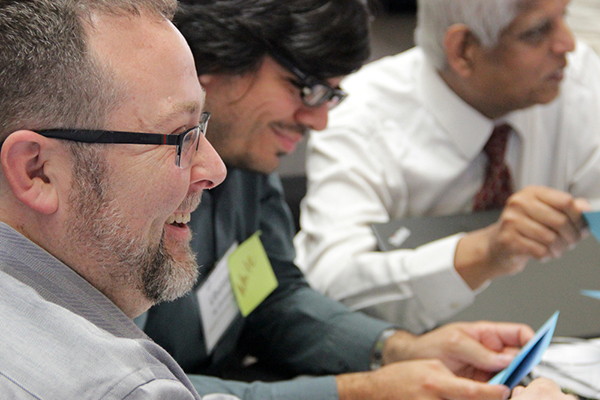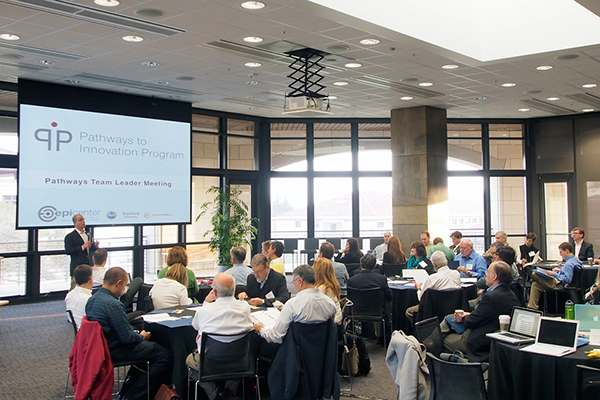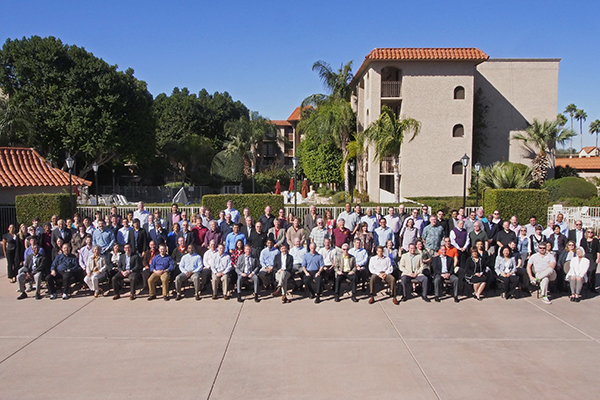


Forging new pathways
UD departments partner to bring innovation, entrepreneurship to undergraduate curricula
1:49 p.m., March 17, 2015--A team of University of Delaware faculty is working to bring innovation and entrepreneurial education to students across disciplines thanks to UD’s selection for the National Center for Engineering's Pathways to Innovation Program.
Faculty members from the Alfred Lerner College of Business and Economics and the College of Engineering will work together over the next two years as part of the Pathways to Innovation program’s second cohort of selected universities.
Campus Stories
From graduates, faculty
Doctoral hooding
“The overarching objective is simply to re-engineer our undergraduate programs to prepare students for the careers of tomorrow — which, by definition, may not yet exist currently,” said Babatunde Ogunnaike, dean of the College of Engineering.
UD’s Pathways to Innovation team includes Ogunnaike as well as:
- Co-team leader Dan Freeman, associate professor of marketing and director of the Lerner College’s Horn Program in Entrepreneurship;
- Co-team leader John Rabolt, Karl W. and Renate Boer Professor of Materials Science and Engineering;
- Yushan Yan, professor of chemical and biomolecular engineering and associate dean for research and entrepreneurship in the College of Engineering; and
- Jeannie Stephens, assistant professor of biomedical engineering.
In February, the team traveled to Phoenix, Arizona, to plan UD’s first Pathways projects, working with other teams from 25 diverse universities.
“Throughout the process we will benefit from active idea sharing between all participating schools,” Freeman said.
The Pathways to Innovation program, run by Stanford University and the nonprofit organization VentureWell, focuses specifically on undergraduate engineering curricula. This will begin with integrating experiential learning in entrepreneurship and innovation into the engineering college’s First Year Experience course.
In addition to expanding current curricula, future projects will include creating entirely new courses and opportunities to learn from successful entrepreneurs.
Freeman said that these changes will be used as “a model for how to engage with all of the seven colleges.”
“Ultimately, we want to create opportunities for innovation and entrepreneurial education for all UD students,” he said. “That’s something that, to my knowledge, no other schools have done: to integrate innovation and entrepreneurial education across all colleges.”
Rabolt agreed, adding that students don’t have to start their own businesses to benefit from entrepreneurial thinking. The team calls innovating within a large company “intrapreneurship,” and this concept is essential for the many UD graduates who build careers with established businesses.
“Big companies want people who have ideas and will push a startup enterprise within the company,” Rabolt said. “They need the right kind of people who can think entrepreneurially within a company and put together the resources and ideas to make it work.”
Rabolt, who came to UD in 1996 after 20 years at IBM, has been working to export the excitement and entrepreneurial spirit of Silicon Valley to UD through his “Entrepreneurship and Risk” course, co-created by accounting chairperson Scott Jones.
This course has led to the creation of multiple successful companies, including multi-touch trackpad manufacturers Fingerworks. Apple Inc. acquired Fingerworks in 2005 and its technology served as the basis for the finger gesture protocols used in the iPhone released later that year.
The Pathways to Innovation team’s projects will incorporate many elements of the “Entrepreneurship and Risk” course. These include the creation of entrepreneurial environments in classrooms and the formation of cross-disciplinary student teams.
Freeman said that cross-disciplinary teams are essential because “while students are building a project to certain technical specifications, they are also thinking about who the end user is and what the market looks like.”
In order for these projects to succeed, Rabolt said that a “spark” from passionate students is critical, and the end-goal is for students to actively drive entrepreneurial activities on campus.
“Students will clearly play an important role in the Pathways process,” Ogunnaike added. “For an entrepreneurial culture to succeed on campus it must be driven from the ‘bottom up,’ not the ‘top down.’”
The first opportunities for student involvement will come this spring, as the Pathways to Innovation team looks to recruit up to five students to join their team and participate in VentureWell’s Innovation Fellows program.
These students “will be part of national network, meeting students from other campuses and working to create a culture of innovation and entrepreneurship on campus,” Freeman said.
In the future, the team will consult with larger numbers of students, as well as faculty, alumni and employers, for feedback and engagement as projects are accomplished. They hope to see tangible results in the UD community as a result.
“Compared to where we were 10 years ago, we want to see more students and faculty starting more companies in Delaware and elsewhere, and we want to see more students being hired for their entrepreneurial skills,” Ogunnaike said. “We also want to see an increase in our intellectual property portfolios across UD.”
“We want to change our culture to a culture of innovation and entrepreneurship, and build a community of creative problem-formulators and problem-solvers devoted to issues in sustainability, energy, health care and the environment,” he continued.
“If students understand when to take risks, and how to manage such risks, then we have provided them with a new set of tools to take with them as they pursue their career goals.”
The National Center for Engineering Pathways to Innovation Program is funded by the National Science Foundation and directed by Stanford University and VentureWell.
Article by Sunny Rosen
Photos by Danielle Steussy and Laurie Moore











